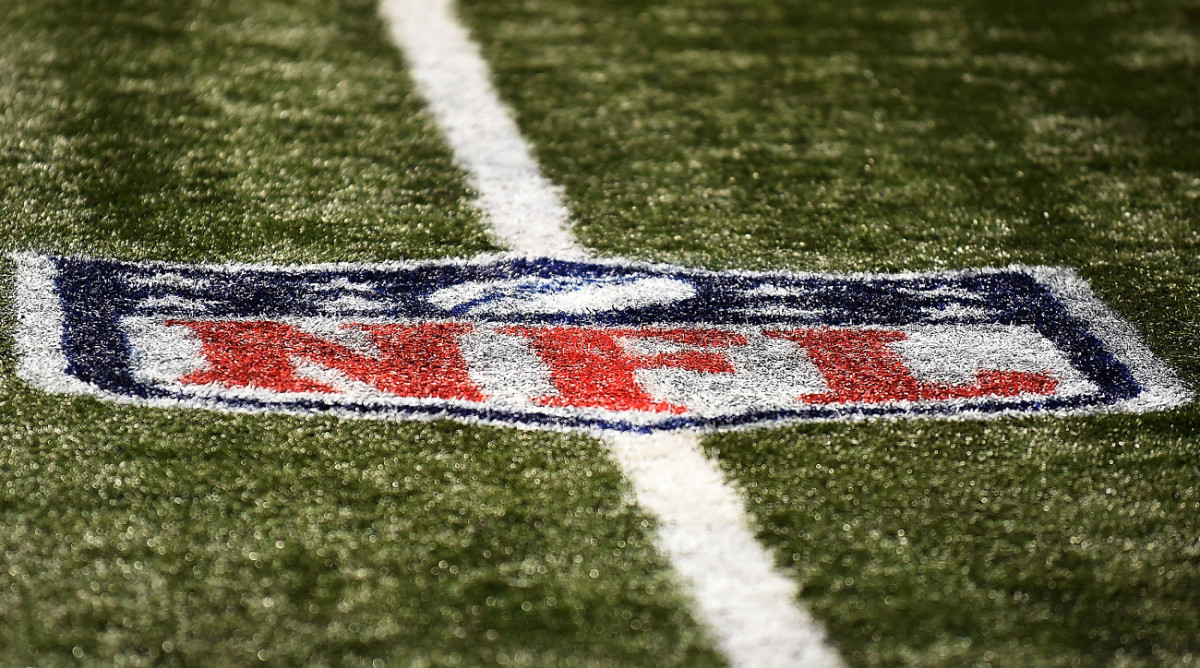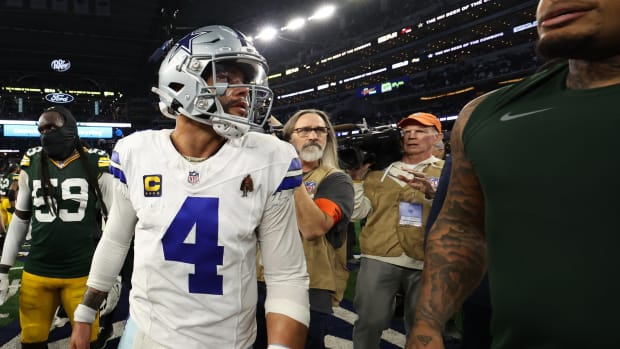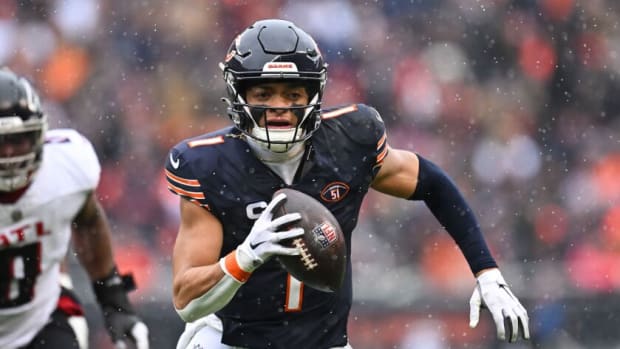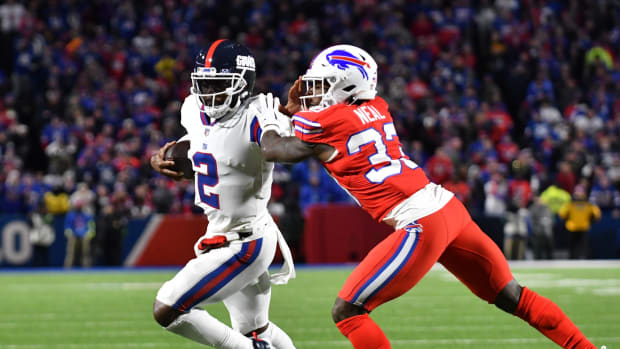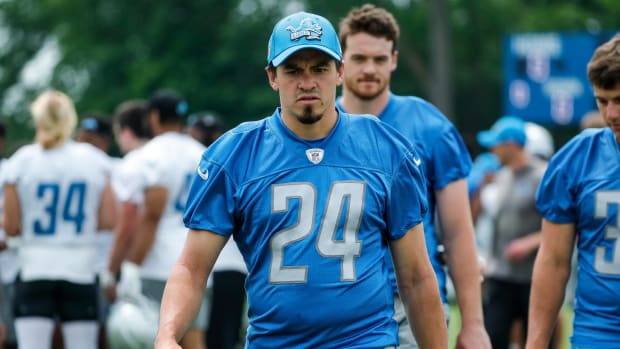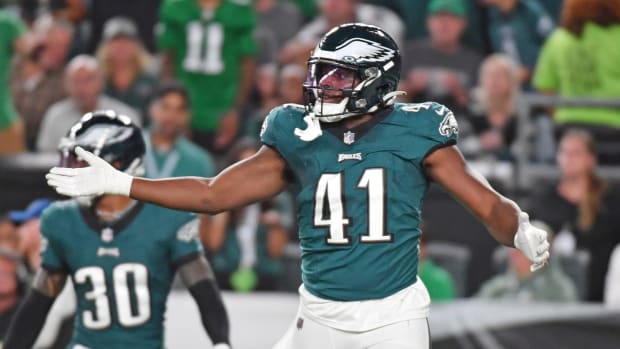A Test of the NFL’s Domestic Violence Policy, Post-Rice
A maid had called the police, and now the cops were questioning the NFL player about his bleeding and distraught girlfriend who’d sought refuge in a bathroom. The officers interviewed the man and the woman, then arrested and booked the player on a charge of simple assault. Cops drove the woman to a police station, and after taking her written statement, told her they could either take her to a hospital to address a hand injury she’d suffered, or bring her to a hotel. She chose the latter, and that night, alone in a hotel room, she began to ask herself how it had come to this.
Just days earlier, she says, the couple had picked out an engagement ring and a house to buy. Now, the morning after the incident, the woman, whom we’ll call Leslie, flew back to the college town where she and the player had met, and where they now shared an apartment. The player—call him James—was under arrest, and his status on his NFL team’s roster was in jeopardy. In the wake of the Ray Rice scandal, the league had drawn up new, more stringent discipline for players who commit domestic violence. James and his team—players, coaches, staff —had recently attended a two-hour NFL seminar on domestic violence.
When word got out about the incident, Leslie says her phone blew up with calls and texts from the player’s friends, former teammates and even the fathers of former teammates. She says it was made clear to her by friends of James—friends she once believed were her own—that she could ruin his life if she pressed charges against him or otherwise cooperated in his punishment. He was a potential victim here.
In the wake of Rice, the NFL hired a team of experts, mostly women, with decades of experience dealing with female victims of crimes including assault and sexual violence. “When I first started doing this 35 years ago, people would commonly say, ‘don’t ruin his career’,” says Esta Soler, an expert on violence against women and children whom the league consulted with. “That’s changing some, and that needs to change more. If a victim is in the public spotlight, there are a number of consequences that private persons do not have to deal with.” This has always been the case with domestic violence: Education and prevention have a long way to go in combating attempts to silence the abused.
“Our relationship was very private,” Leslie says, “and a lot of people we knew didn’t believe he could do that. People accused me of making it up, even though I didn’t even want to press charges. They said I was ruining his life, and he would never do something like that to me. But at the same time, I have all these bruises.”
One of the fathers of James’s former college teammates, she says, was more persistent than others, calling, texting and even approaching Leslie in person in what she felt was an effort to intimidate her. Fed up, she eventually emailed him photos of bruises she’d suffered.
“He never responded,” she says, “or apologized.”
That evening in the hotel room, Leslie called her two best friends to tell them what happened. Then she called her parents. “At first, they couldn’t believe me,” she says. “My parents loved him, adored him. Then, they were infuriated with him.”
The conversation was brief; Leslie didn’t want to continue reliving the experience. After they hung up, she says, her father went downstairs to his sports-themed man-cave, where he kept James’s college jersey, framed along with a picture of James and his daughter. He ripped the frame off the wall and shattered the glass on the floor.
* * *

Lisa Friel, a former sex crimes prosecutor, was brought in by the NFL in September 2014 to strengthen the league’s policies and procedures regarding domestic violence.
Seth Wenig/AP
There have been eight NFL players arrested on domestic violence-related charges since Ray Rice punched his then-fiancée inside an Atlantic City hotel elevator in February 2014. That’s at least eight test cases for the NFL’s shifting policy regarding violence against women. Commissioner Roger Goodell hired former Manhattan sex crimes prosecutor Lisa Friel in September 2014 to help strengthen and redirect the league’s efforts to address and punish domestic violence and sexual assault, after Goodell had been severely criticized for the gross mishandling of the Rice case.
The MMQB attempted to contact the victims in those eight cases through various means. After a lengthy Facebook back-and-forth, Leslie agreed to speak on the condition that her name not be used. Google search results, she believes, are one of the few aspects of her life that aren’t stained by what happened, and she wants to keep it that way.
Leslie’s name was redacted from the police report that was made public, and she never spoke openly about that night because she said she wanted nothing more than to make it all go away. She declined to testify, and the state dropped the charges. She says she and James continued talking, though not romantically. (The player, through his agent, declined to speak to The MMQB except to say that her characterization of their relationship is erroneous.)
Leslie says she was first contacted by the NFL several days after James’s arrest, but she only agreed to discuss the incident months later, after repeated inquiries by league representatives via letter, email and phone. This type of outreach was uncharted territory for the NFL, which had previously relied on the courts to provide direction for its own punishment of offenders. Rice, who entered pre-trial intervention rather than go to court on a charge of aggravated assault, was suspended for two games by the NFL after a discipline hearing overseen by Goodell. When video of the assault in the elevator became public months later, Goodell made the suspension indefinite, a ruling that was overturned by a judge on appeal. The haphazard manner in which the Rice case played out, with investigations and discipline being undertaken by NFL administrators with little experience in domestic violence, made it clear that the league needed to professionalize how it handled this issue.
According to a new NFL policy adopted last winter, Friel’s team is to conduct a thorough investigation into any allegations at the conclusion of the legal process, whether a case is brought against a player or not. “The league decided they are not solely going to rely on the court’s outcomes,” Friel says. “Now they’ve decided since it is their own policy, to do their own investigation. Once they determined to do that, they needed the in-house resource of people experienced in doing investigations.”
Friel’s team often hires outside consultants who are tasked with obtaining interviews with alleged victims, whether they are cooperating witnesses in a criminal investigation or otherwise. One goal is to obtain text messages and other communications that the league might find helpful in reaching a resolution independent of the criminal justice system. On occasion the consultants have found themselves wrestling with local law enforcement agencies for access to sealed documents or interviews with first responders. They then take the sum of the information gathered and make a recommendation to Goodell on player discipline.
“We will push these things to the extent of the law to get what we think we’re entitled to, in order to make sure the investigation is as thorough as possible,” says Friel. “This policy is meant to be as fair as possible and not driven by any philosophical point of view. Do we have enough evidence to say the policy was violated, or do we not?”
Former Cook County assistant state’s attorney Nancy Wilder, the NFL’s consultant in Leslie’s case, met Leslie and her lawyer in the latter’s office. Wilder told Leslie that her law firm’s task was to gather information to help determine appropriate league discipline for James. Leslie handed over texts and emails to Wilder, then sat down for a three-hour interview, with her own lawyer present. The NFL eventually concluded its investigation and took action in the case.
The experience was an eye-opening one for Leslie. “My goal was never to ruin his life,” she says about her decision to speak to the NFL. “I know how hard he’s worked to get where he is. I wouldn’t feel good about myself being that malicious. I just want him to get help.”
* * *
Pressure from athletes and promises of compensation are among the biggest reasons domestic violence cases in the NFL rarely go to trial and almost always end in out-of-court resolution or dismissal. Prosecutors in the case against former Panthers defensive end Greg Hardy said that they dropped the charges against him after receiving “reliable information” that the two sides had reached a settlement.
Leslie says she never sought or was offered compensation. James’s agent and lawyer stayed in regular contact with her beginning the morning after the arrest, she says, in order to assess her state of mind. She says it made for awkward conversations with the agent, who she felt was walking a fine line between expressing concern for Leslie and protecting his client’s interests.
One night while Leslie was mulling whether to cooperate with the NFL, she went out with friends to a bar popular with athletes. She was desperate to blow off steam after weeks and months of regular contact from James’s circle, the state’s attorney’s office, her lawyer and representatives from the NFL. “I was having panic attacks at work because of it,” she says.
She looked up from her drink and realized James was at the other side of the circular bar. It was his offseason, and he’d returned to his college town to be with friends. She set her drink aside and walked out.
“It’s the worst feeling in the world, because I don’t know what his reactions are going to be,” she says. “He was upset because I wasn’t cordial. He called me and said, ‘You could’ve come over and given me a hug, and I would’ve bought you a drink, and we could’ve talked about things.’ He doesn’t realize the things I still have to go through because of him.”
Some advocates, like Soler, recommend that the NFL add individual consultations with players as a means of prevention, as opposed to punishment. The NFL’s efforts have yet to extend to individual, preemptive evaluation. (As of now, individual counseling is mandated as part of league discipline.) “If this is learned behavior, it can be unlearned,” says Soler. “Many abusers witnessed similar abuse as a child. If you can reach these men at a personal level, identify that history and treat it, you can reverse that behavior.” Such preemptive intervention, meant for players with a history of violence, wouldn’t have applied to James, who had no previous arrests or accusations.
Some days after I first interviewed Leslie, I called to check in with her. Six other women I’d reached out to had either ignored my request or decided not to participate. Why, I asked, did Leslie decide to talk?
“I thought about how little I knew about abusive relationships,” she said, “and I think, maybe, if there had been an article, I might have read it and saved myself.”
Editor’s note: The player was left unidentified in this story in order to help maintain the women’s anonymity and to keep the focus of the piece on NFL’s investigatory policies and processes.
































